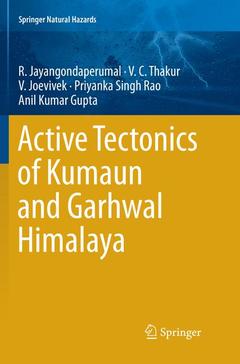Description
Active Tectonics of Kumaun and Garhwal Himalaya, Softcover reprint of the original 1st ed. 2018
Springer Natural Hazards Series
Language: English
Subject for Active Tectonics of Kumaun and Garhwal Himalaya:
Publication date: 12-2018
Support: Print on demand
Publication date: 03-2018
Support: Print on demand
Description
/li>Contents
/li>Biography
/li>Comment
/li>
The book contributes to understanding the pattern of strain release and the level of seismic hazard imposed by large-great earthquakes in the frontal fold-thrust belts of Kumaun and Garhwal regions of Uttarakhand. The motivation for active fault studies and their characterization have been emphasized. The book presents the compilation of knowledge garnered in multidisciplinary or proxy studies involved in the understanding of seismic hazard in general and Kumaun?Garhwal Himalaya regions in particular with lucid new maps draped on modern Cartosat or SRTM DEM data. It also discusses satellite image calibration, active faults identi?cations, and map productions with ?owchart. The book discusses window-wise active fault elements with attributes together with the tectonic geomorphic map. It also includes active fault scarp with topographic pro?le along with ?eld photographs. Finally, it reviews all existing seismotectonic models of the Himalaya, its earthquake hazard, and its vulnerability, speci?cally for Kumaun and Garhwal regions.
Chapter 1. Introduction.- Chapter 2. Mapping of Active Faults.- Chapter 3. Active Faults in Kumaun and Garhwal Himalaya.- Chapter 4. Concluding Comments and Structure of Online Interactive Active Fault Database.
Dr. R. Jayangondaperumal is a Senior Scientist in the Wadia Institute of Himalayan Geology, Dehradun. He has been working in research projects related to structural geology, earthquake geology, and tectonics for over one and a half decade. Dr. Perumal and his team have excavated about 25 trenches for paleoseismological study along the Himalayan frontal zone. He has significantly contributed in understanding the relationship between strain accumulation and release in context of mechanics of earthquakes and mountain building processes so as to quantify the seismic hazard associated with the Himalayan continental collision. He has also carried out seismic hazard assessment for the Subansiri hydro-power project in the NE Himalaya. He has published over 46 papers, and contributed two book chapters and one Indian Patent. Currently, he along with his large team of students carrying out national level research projects on earthquake geology in NE and NW Himalaya.
Dr. Vikram C. Thakur is M.Sc. Panjab, and Ph.D. DIC London University. He joined the Wadia Institute of Himalayan Geology in 1972. He has worked extensively in unravelling the regional framework and tectonics of the remote regions of Ladakh, Zanskar, Chamba, Garhwal, Kumaun, and Arunachal. On his retirement as Director of the Institute he was awarded Emeritus Scientist of the CSIR, since then he has been working in several research projects on active tectonics of the Himalayan frontal zone. He has published more about 130 papers and authored a book “Geology of Western Himalaya”, Pergamon Press, Oxford. He is a fellow of the Indian Academy of Sciences (1991) and recipient of the National Mineral Award (1984).
Dr. V. Joevivek is a Professor and Dean (Research) at Akshaya College of Engineering and Technology, Coimbatore. His field of specialisation is remote sensing and physical geography. He has published over 15 papers, one book chapter and contributed two Indian Patents.
Presents modern measures of GPS to define the rates and patterns of strain accumulation across the Himalayan arc
Includes topographic profile along with field photographs and window-wise 3D anaglyph images
Reviews all existing seismotectonic models of earthquake hazard regions of Kumaun

